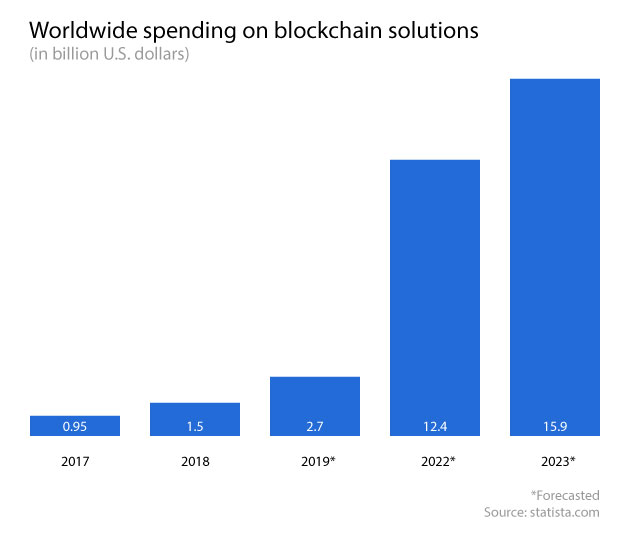Blockchain technology offers advancements that can significantly improve the shipping and transportation logistics industries. Shipping Software with Blockchain features implemented will allow shippers to ship their goods with more reliability, lower costs and higher levels of transparency. Below, we will explore how this is possible:
Better Trust and Reliability During Shipping
The many moving parts involved in the shipping process such as time stamps, proof of delivery, rates, and accounts can all live within the blockchain environment. In the blockchain each of these important pieces of information would be immutable. This means that there would be an increase in trust between all parties involved since each piece of data is verified by multiple parties and cannot be altered by anyone. Furthermore, the data being used by Shipping Software on Blockchain is public and managed by all members of the blockchain rather than a single organization or entity. The result is increased trust.
Cost Savings
Every company currently exceeding hundreds or thousands of shipments per month experiences expensive costs tied to errors, inconsistencies, record keeping, and having to work with several third-party agencies at once. Implementing Blockchain technology reduces the need for excessive third-party integrations and creates a comprehensive system that is statistically more reliable than today’s standard shipping solutions.
Better Carrier Compliance
If carriers such as FedEx, UPS, USPS and DHL choose to work with Blockchain technology, then working with the carriers will be easier for all Shipping companies in comparison to what it is like today. The reason is simple to understand. If both Shippers and Carriers are using blockchain technology then the many layers of formality, security and compliance that exist between shipper and carrier today, will be substantially reduced.
Smart Contracts with Multiple Carriers
Blockchain technology enables the use of “smart contracts” with Multi-Carrier Shipping integration. A smart contract is a contract that exists virtually, sits on the blockchain network, and can be customized to record and execute tasks automatically. In other words, the multiple carriers involved in shipping a company’s goods can all create smart contracts in one collective place on the Cloud and have tasks be executed more quickly and reliably than without a blockchain environment. Tedious processes such as working with international customs and your carrier can be simplified since most actions can be executed automatically based on custom business rules rather than manually.
Improved Security
Since Blockchain is immutable in nature and has full transparency, all parties involved can see and track a process at each step. All information is encrypted and stored in secure “chains” (blocks of data) that cannot be controlled or manipulated by a single person or organization. This makes the Blockchain environment exponentially more secure than today’s non-blockchain shipping systems.

Conclusion
Without a doubt, Blockchain will be a significant part of the future of working with multiple carriers in the shipping industry. Its implementation into Multi-Carrier Shipping Software is inevitable and has already begun happening on a smaller scale. It is important to note however, that Blockchain technology’s growth within the shipping industry will happen gradually over 10 – 20 years and will not be immediate. Part of the reason that shippers are not rushing to implement Blockchain technology into their software all at once, is because its results take time to show and because it’s improvements although numerically significant, will not be exponential. That being said, shipping companies not implementing Blockchain technology at all over the coming years will place themselves at a competitive disadvantage to those who will.

Pavan Telluru works as a Product Manager at ShipConsole. He brings over a decade of experience to his current role where he’s dedicated to conducting product demos to prospects and partners about how to organizations can efficiently manage their shipping execution process. He also leads marketing efforts at ShipConsole.

